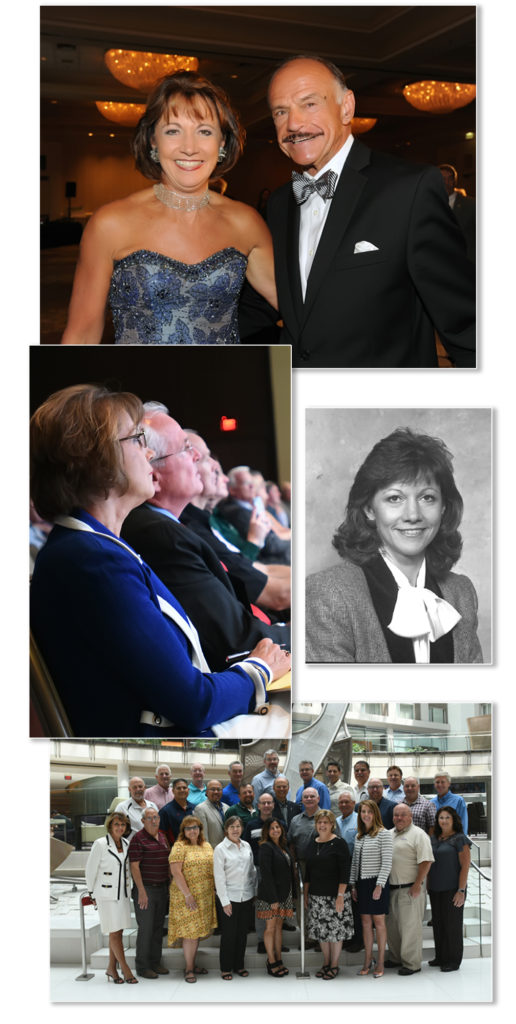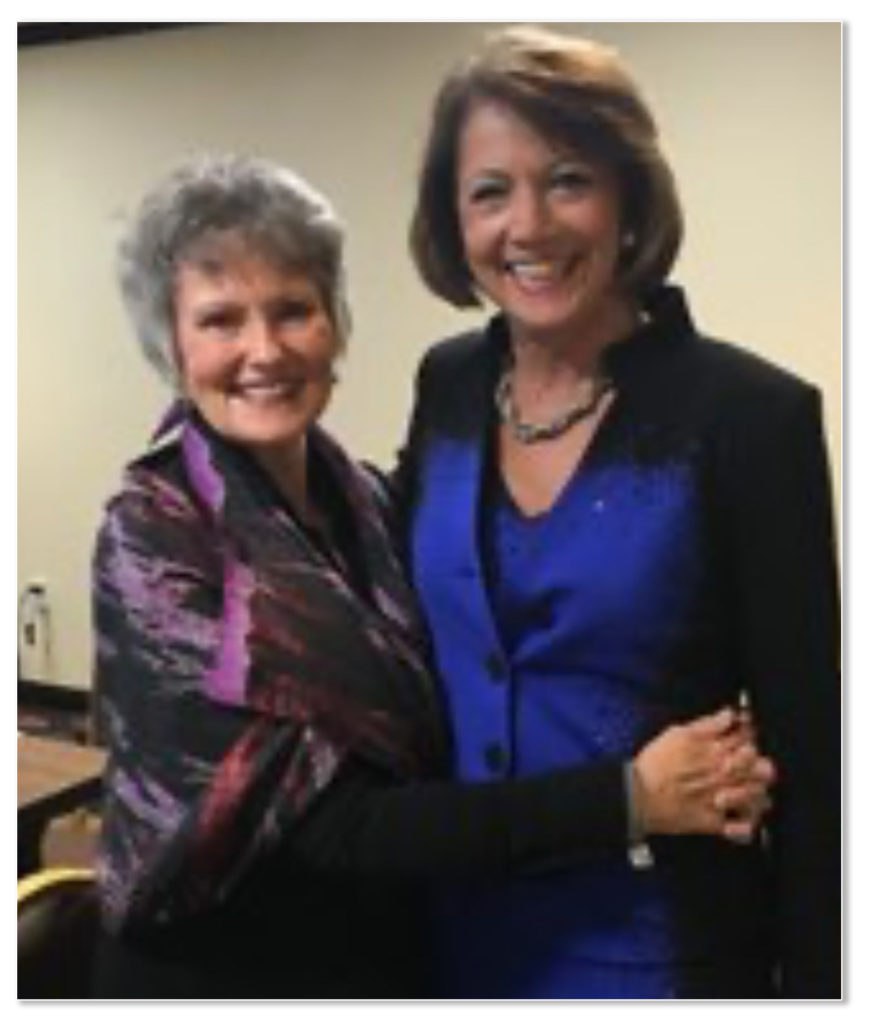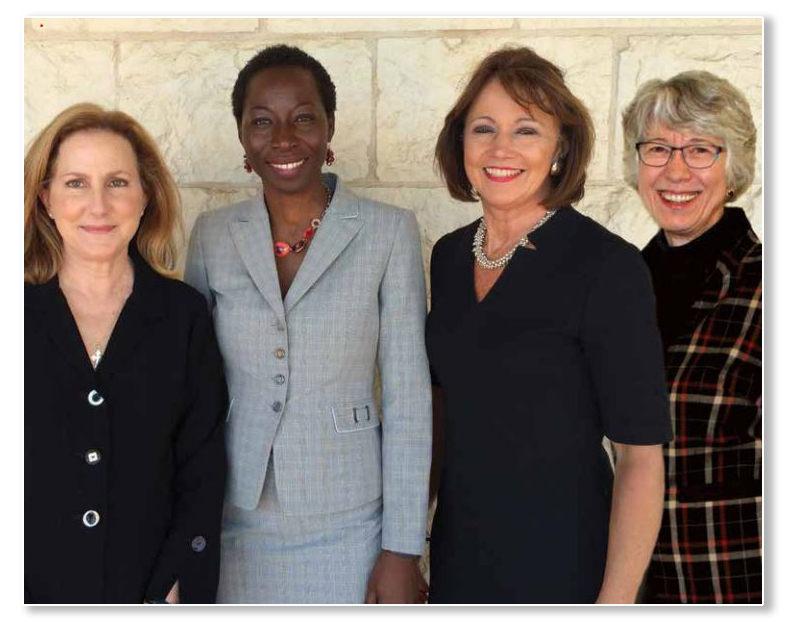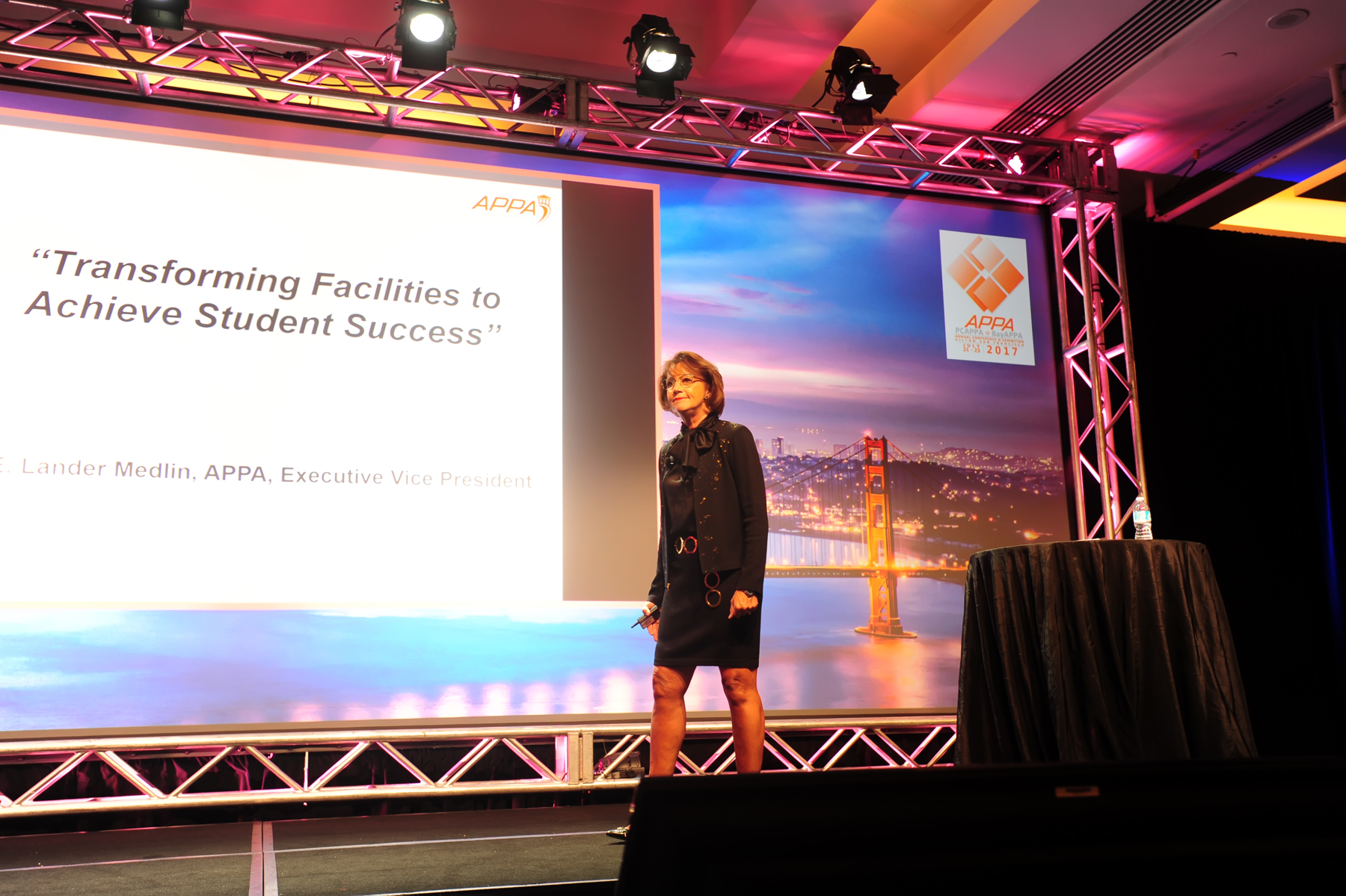
Lander in her professional roles, and with husband, Ron Medlin, at an Awards Dinner during an APPA Conference .
Lander Medlin is …
a) Tireless
b) Larger than life
c) People-centric
d) A fearless leader
In fact, she’s all of the above.
And, despite having recently retired from APPA because she has stage four non-small cell lung cancer (we’ll get that out of the way up front), she’s not shy about it, not shy about talking about her treatment (it’s going well), or how she will overcome this.
“I am essentially a lung cancer survivor at this moment. And I’m moving forward,” she tells me, across her kitchen table and many miles via Zoom.
As we talk, she holds Bones—“Mr. Bones, to you”—her three-month old miniature boxer named for a mobster from Elmore Leonard’s Get Shorty. She rubs his ears, smooths his back, and lifts his pudgy mug to the screen. Ron, her husband of 39 years, is also at the table, just off camera. He has leukemia, and Lander has been his caregiver since 2014.
One would think a new puppy would be a burden as Lander and Ron face daunting health challenges. But the dog, she says, has given them a lifeline. “I get more exercise, which is important. I’ve got to keep up my health profile.”
True to form, Lander has put a positive spin on her private life—just as she has put positivity into her 30 years as APPA’s President & CEO. “I can’t stay unhappy or negative for more than 15 minutes,” she says. “I just can’t see the value in it. It’s a waste of time and it keeps you in a state where you can’t think in a way that helps you solve problems.”
I fell into facilities management
Lander didn’t start out to be a kick-ass association leader. Like many girls growing up in the 1960s and 1970s, she was meant to be a teacher, but she left her teaching degree on the table and took a different path.
In 1976, she took a job in the physics and astronomy department at the University of Maryland, where she’d done her undergraduate work (and would later earn a master’s in the social foundations of education). The dean saw her potential, and she followed him to a new job in the mathematical, physical sciences, and engineering division, where she worked on accounting and business projects (she had minored in business). While there, she learned about engineering. As things were explained to her, she recalled keeping a drawerful of little diagrams drawn on napkins to refer to.
Then, when Harry Kriemelmyer moved to head the university’s department of physical plants, he told Lander to interview for a job there, which she got. “They gave me the opportunity to go to my first APPA meeting,” she says. “It was the 1983 annual meeting, and it was the coolest thing ever. I was so hooked.”
While it was difficult being a woman in a field dominated by men, Lander could hold her own. She describes herself as a “tomboy,” growing up with three brothers. She learned how to fend for herself, learned to shoot a gun, and how to hunt. She’d eventually ride motorcycles.
“My two older brothers used to terrorize me,” she says. “I learned to run really fast and climb out on the skinny edge of a tree limb so they wouldn’t beat me up.”

With Maggie Kinnaman, University of Maryland- College Park, mentor and long-time friend.
Maggie Kinnaman, director for business administration for the facilities division at the University of Maryland, Baltimore (now retired), has known Lander since 1980, first as a colleague and then as a close friend. She says they bonded not only because they were women in a predominantly male field, but because she, too, has three brothers.
“We used to laugh at the men who thought they could intimidate us,” Kinnaman says. “It was nothing like being intimidated by brothers who were experts at it.”
Lander also credits “a ton of male mentors” for her successes. She never felt she faced a glass ceiling, because even when things didn’t go her way, she learned something. She offers the example of not getting hired as assistant director of maintenance and operations at the University of Maryland in 1992. She knew deep down that it was the right decision on the part of the department. However, she went to speak with the business officer directly to ask why he made the decision not to hire her.
“He gave me his argument—among other things—that I wasn’t a journeyman mechanic and that role needed it, and I went, ‘Hmm, that makes good sense.’ But he told me that if the head of the physical plant or the head of construction were to leave, he’d hire me in a heartbeat. I said, ‘Wow, that’s good to know’ and thanked him for being honest and direct. He told me he appreciated me coming by and recognized that it took a lot of courage to speak with him.
He said, ‘You’re going to go places.’”
Lander was buoyed by that vote of confidence. And what did she learn?
“Never say no to anything. What’s the worst that can happen? So, you flub that, or you didn’t, but you’re always going to learn something.”
“Never say no to anything. What’s the worst that can happen? So, you flub that, or you didn’t, but you’re always going to learn something.”—Lander Medlin
The more she worked in the industry, the more she got involved with APPA. After 11 years as a member, including several on the education committee, Lander had the opportunity to move into a leadership position, as associate vice president. “I needed to be that person,” she says. She believes as AVP she gave the organization “a sense of who I am and what I’m about—building a culture of giving back, and caring and concern for one another, because you can’t do this profession individually.”
Three years later, in 1994, she became APPA’s President & CEO.
Lift as you climb

With other FM women at APPA (L-R): Mary Vosevich, University of Kentucky; Winnie Kwofie, California State University-East Bay; Lander Medlin, APPA; and Jeri Ripley King, University of Iowa.
Lander’s people skills are legendary among her colleagues.
“She exemplifies Maya Angelou’s statement, ‘People will forget what you said. People will forget what you did. But people will never forget how you made them feel’,” Kinnaman says.
“Lander makes you feel fantastic during every interaction,” says Chuck Farnsworth, the former Senior Vice President of Public Programs and Education in Franklin Covey Company, who has a consultative role as APPA’s Senior Director of Education Programming, “Lander would build a rapport with people. Just because she was PRESIDENT & CEO, didn’t mean she treated people differently. They felt like they had a relationship with her, as well as with APPA.”
Mary Vosevich, vice president and chief facilities officer at the University of Kentucky, and a longtime friend of Lander’s, says that the theme for her APPA presidency was “lift as you climb,” a phrase originated by civil rights author and women’s suffrage advocate Mary Church Terrell.
“And that’s Lander. If for a minute we forget that this is a people business, then we’ve lost. I credit Lander with understanding that and the impact that the people have on our organizations, not just within facilities but at all our respective universities.”
Lander’s enthusiasm for her staff energizes her, and as we speak, she trains her big eyes and bright smile on me and gains momentum with hand gestures and a voice full of passion. She talks about her role as a bulwark between the board and her staff. “If I don’t stand for the staff, I don’t stand for anything,” she says, regarding a thorny salary issue she dealt with early on. She didn’t want the board to make salary determinations, telling the board, “I will do exactly what I need to do with the staff because I know what they do every day.” The board listened to her.
Farnsworth points out that she “is able to have crucial conversations wherever they’re needed. She can address an issue but do it in a way that doesn’t strip the other person of their dignity.”
It’s when Lander speaks about the members of APPA—not the institutions, but the custodians, housekeepers, and other individuals that populate the universe of higher education facilities—that her passion comes through full force.
It’s when Lander speaks about the members of APPA—not the institutions, but the custodians, housekeepers, and other individuals that populate the universe of higher education facilities—that her passion comes through full force.
She tells the story of one of the many APPA banquets she attended, for which she always dressed to the nines, sometimes in a sequined gown—“to honor the members,” she says. “One night, a member dressed in a graduation outfit because he had never graduated. It made me cry, and it’s going to make me cry now.” Which she does, her face open and honest, full of feeling.
“He was so excited to be up on that stage with his cap and gown. And everybody gave him a standing ovation. I leaned into him, and I said, ‘This is awesome. This is exactly how you should feel about your accomplishment. You earned this. You get the respect of your colleagues because you did the work, and I’m very proud of you.’”

Lander in her many APPA roles at the APPA events she participated in throughout the country.
Lander feels that way about every one of APPA’s members. She understands that it’s these people who are in direct daily contact with all the stakeholders on a campus. “They’re not just a housekeeper. These people on the front line are critical. They know things, they see things that others, not even faculty members, see,” she says. “If they were viewed in a better light, then people might actually see the unbelievable value they bring.”
Creating strategic enablers
Lander’s focus on people connects directly to her goals of professionalizing the industry. As a tireless researcher, educator, and speaker, she supports “continuous learning to prepare for every future,” she says.
“Because if you don’t, if you’re not constantly learning, then you’re not growing. And everybody has to learn and change and grow. I don’t care who you are.”
During her tenure as president & CEO, she helped create initiatives such as Thought Leaders, Regional Representatives, the Leadership Academy (based on a collaboration with Franklin Covey and the principles of the The 7 Habits of Highly Effective People®, The Institute for Facilities Management, APPA’s credentialing program, the Center for Facilities Research (CFaR), the Supervisor’s Toolkit, and APPA’s Body of Knowledge (BOK). She also built close ties with organizations such as the National Association of College and University Business Officers (NACUBO). “The educational programs that Lander has been such a large part of have elevated our profession. It’s just amazing,” says Vosevich.
By helping professionalize the facilities arena, Lander “helped us get a seat at the table,” Vosevich says. “That’s one of her biggest accomplishments, really transforming who we are.”
“Lander has the perfect balance of understanding the members and understanding the business side of the association,” says Steve Glazner, APPA’s recently retired director of knowledge management, who worked with Lander for three decades. “For years, facilities were looked at as the first place to cut [costs] on a college campus. Lander was excellent in helping the business office understand the repercussion of cuts.”
The facilities world in higher education can be high stakes, but Lander has been “artful in shifting the paradigm,” Kinnaman says. “She helped the business offices see that those in the facilities arena are strategic enablers. She turned the focus from looking at facilities as just mechanical or physical spaces to how it affects the customer living in those spaces. This was a strategic move. Facilities could now be seen as influencing the outcome and the visioning of the future of higher education.”
By helping professionalize the facilities arena, Lander “helped us get a seat at the table,” Vosevich says. “That’s one of her biggest accomplishments, really transforming who we are.”
Lander has done so for these past 30 years “applying what seems like limitless energy. I’ve never seen her slow down,” says Larry Goldstein, president of Campus Strategies, LLC, based in Crimora, Virginia, who helped Lander design and facilitate the two-day annual Thought Leaders series for nearly 20 years. “That’s what makes her current health issues striking and scary. She’s a larger-than-life person, and you don’t think people like that will ever get sick.”
But Lander won’t allow those around her to see her in a different light or treat her any differently.
“This isn’t the way I wanted to retire, but it was critical that I do this. I felt like I had enough integrity and enough honor toward this profession, and toward the staff, and toward the board, and toward the members, not to drag them through the chaos that I’m dealing with. They needed one hundred percent of whomever was going be in this role, and I was not going to be able to do that any longer,” she says near the end of our time together.
Then she reaches across the table to help Ron. She warns him to take care and not trip over the puppy’s leash. They’re heading outside for a walk.

Special thanks to Photographers Rhonda Hole and Michael Dosik.
Stacey Freed is a freelance writer based in Pittsford, NY. She can be reached at [email protected].



